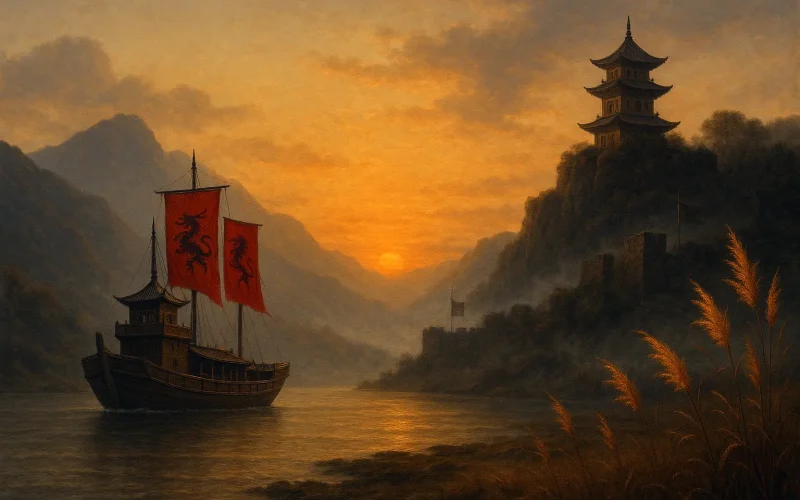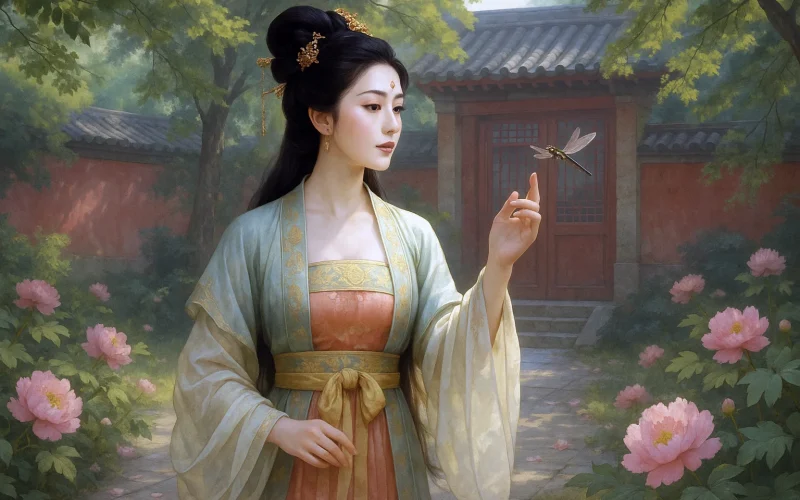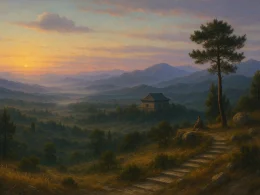Since Wang Jun brought his towering ships down from Yizhou,
The royal ghost has pined in the city of Nanjing.
Ten thousand feet of iron chain were sunk here to the bottom --
And then came the flag of surrender on the Wall of Stone....
Cycles of change have moved into the past,
While still this mountain dignity has commanded the cold river;
And now comes the day of the Chinese world united,
And the old forts fill with ruin and with autumn reeds.
Original Poem
「西塞山怀古」
刘禹锡
王濬楼船下益州, 金陵王气黯然收。
千寻铁锁沈江底, 一片降旛出石头。
人世几回伤往事, 山形依旧枕寒流。
从今四海为家日, 故垒萧萧芦荻秋。
Interpretation
Composed in 824 AD (the fourth year of Changqing era) during Liu Yuxi's transfer from Kuizhou to Hezhou prefectures, this poem was inspired by the poet's passage through Xisai Mountain along the Yangtze. Confronting this historic site, Liu reflects on the Jin dynasty's conquest of Wu, using historical analogy to critique contemporary separatist tendencies while extolling national unity.
First Couplet: "王濬楼船下益州,金陵王气黯然收。"
Wáng Jùn lóu chuán xià Yìzhōu, Jīnlíng wángqì ànrán shōu.
Wang Jun's tower ships sailed down from Yizhou / Jinling's royal aura faded from view
The opening couplet establishes the historical tableau with cinematic sweep. "Tower ships" (楼船) visualize the imposing Jin naval force, their verticality contrasting with the horizontal "sailed down" movement. Jinling's (modern Nanjing) "royal aura" (王气) - a metaphysical concept of dynastic legitimacy - dissipates under military reality. The spatial progression from upper river (Yizhou) to lower capital (Jinling) enacts the conquest's inevitability.
Second Couplet: "千寻铁锁沈江底,一片降旛出石头。"
Qiān xún tiě suǒ chén jiāng dǐ, yī piàn jiàng fān chū Shítou.
Thousand-fathom iron chains sank beneath the tide / While surrender flags atop Stone City cried
This couplet constructs a vertical drama: submerged defenses versus elevated surrender. "Thousand-fathom" (千寻) hyperbole emphasizes Wu's futile technological overreach against strategic inevitability. The "iron chains" (铁锁) - historical defensive installations across the Yangtze - become drowned relics, while the singular "surrender flag" (降旛) signals unified capitulation. Stone City (石头城), Jinling's fortress, transforms from stronghold to symbol of defeat.
Third Couplet: "人世几回伤往事,山形依旧枕寒流。"
Rénshì jǐ huí shāng wǎngshì, shān xíng yījiù zhěn hán liú.
How often has mankind mourned history's flow? / While mountain forms still pillow cold streams below
The perspective shifts from historical reconstruction to philosophical meditation. "Mankind" (人世) and "history" (往事) operate in human temporality, contrasted with geomorphological permanence. The anthropomorphic "pillow" (枕) for mountain shapes suggests nature's eternal repose versus human agitation. "Cold streams" (寒流) metaphorize time's inexorable current beneath apparent stability.
Fourth Couplet: "从今四海为家日,故垒萧萧芦荻秋。"
Cóng jīn sìhǎi wéi jiā rì, gù lěi xiāoxiāo lú dí qiū.
Now all under heaven share one home's delight / Where old forts stand bleak in reeds' autumn light
The resolution juxtaposes political unity ("all under heaven") with nature's cyclical decay. "One home" (为家日) idealizes unified empire, while "old forts" (故垒) materialize abandoned militarism. The onomatopoeic "xiāoxiāo" (萧萧) evokes reeds whispering historical lessons. Autumn's (秋) traditional symbolism of decline here carries paradoxical hope - the seasonal death preceding renewal mirroring historical cycles.
Holistic Appreciation
Using Xisai Mountain as focal point, the poem progresses through four historical perspectives: triumphant conquest (I), defensive failure (II), temporal reflection (III), and unified present (IV). Liu Yuxi's technique of layering past and present creates profound resonance - the 3rd century Jin-Wu conflict mirroring 9th century Tang concerns about regional separatism. The work's power derives from its balanced structure: two couplets of historical narrative followed by two of philosophical contemplation, all unified through consistent riverine imagery.
Artistic Merits
- Strategic Allusion: Wang Jun's campaign becomes paradigm for unification's inevitability
- Sensory Contrast: Metallic chains vs. fluttering flags, human clamor vs. natural stillness
- Perspectival Shifts: Zooming from naval movements to cosmic contemplation
- Symbolic Economy: Autumn reeds encapsulate both remembrance and warning
Insights
This Tang masterpiece transcends its immediate context to speak to perennial tensions between unity and fragmentation. Liu's vision of shared homeland ("all under heaven share one home") remains profoundly relevant in contemporary discussions of nationalism and globalism. The poem ultimately suggests that while military fortifications decay, the true markers of civilization endure in cultural memory and geographical permanence. Its closing autumn scene - where historical trauma is both memorialized and transcended - offers a model for reconciling past conflicts with present unity.
Poem translator
Kiang Kanghu
About the poet

Liu Yuxi(刘禹锡), 772 - 842 AD, was a native of Hebei. He was a progressive statesman and thinker in the middle of the Tang Dynasty, and a poet with unique achievements in this period. In his compositions, there is no lack of poems reflecting current affairs and the plight of the people.











